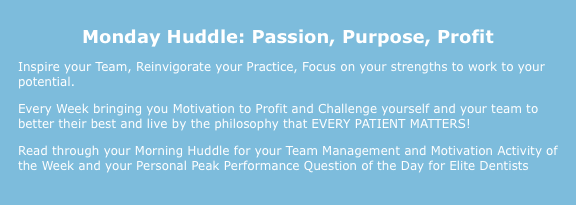Inside of this one phrase just might reveal the most significant difference between the people who are great influencers and the people who just pretend to try.
If you are here reading this Monday Huddle, then you already understand your responsibility to educate, motivate, and encourage your patients to move forward with their health (believe me, not all do).
With every single conversation and patient interaction, you have an opportunity to make a difference in someone’s life. Your ability to do exactly that comes down to this…
Giving in to patients’ excuses versus helping them understand the benefits of treatment to move beyond what’s standing in their way.
You can’t be of any service or help by pandering. As I mentioned last week, patients (and everyone, for that matter), default to staying the same instead of making a smart, albeit sometimes difficult, decisions for themselves.
And that’s just it. It is for them, for their benefit.
They are not doing you a favor by accepting treatment, investing in their health, and paying you money. This is not a gift they are giving to you.
It is their responsibility to own their health and take appropriate steps to improve it. However, it is your responsibility to help them get.
Whether this is on the phone regarding insurance or in the treatment room during case work ups or hygiene or surgical consults or treatment presentations – when discussing the pathway to health and money, you want to focus on what is in the patient’s best interest.
That seems obvious, right? You wouldn’t recommend anything that isn’t in the patient’s best interest; which means every treatment you present should be accepted if the patients desire to improve their health and enhance their lives.
This ties into our ongoing discussion from the last several weeks. It all comes together to this point right here at the very end of the line… you are going to either win or lose with your patients based on whether they move forward or not.
Just like the human tendency is to go against the positive, it is also to make and accept excuses. Don’t make excuses in your life and don’t let your patients make excuses in theirs.
You can, and should in fact, be empathetic, but not to the extent of giving up control. Express how much you understand their reluctance, share your own personal stories or that of other patients, and connect on a personal level.
Meeting them where they are without judgement (i.e. empathy), is critical to helping the patient progress. Be their guide by helping them work through their excuses, obstacles, and hesitations so they end up with a positive decision for their health.
As a team, talk about what you allow patients to say that undermine their own goals. Go to work on growing your confidence, being more aware, and committing to helping your patients through this by expressing empathy instead of accepting excuses.
Next week, we’ll work on some examples together.



